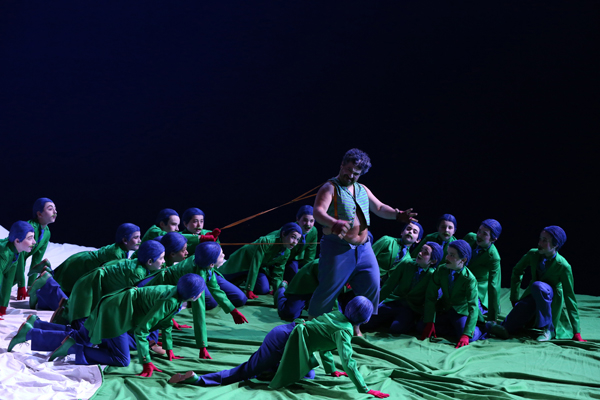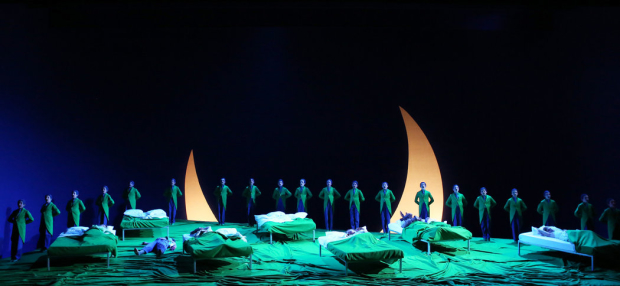'Seat belts in bed': Emmanuelle Bastet shares tales from the Dream
As Robert Carsen’s production of Britten’s Shakespeare opera returns to ENO, its revival director talks to WhatsOnStage.

© Patrick Berger
Pretty soon when people find out I write about opera they’ll ask: 'what’s the best production you’ve ever seen?' And I cannot answer, for who can possibly define 'best'? Instead I deflect the question and offer up my favourite production – not quite the same thing – which is an opera I first saw at the Aix-en-Provence Festival in 1991.
The Canadian director Robert Carsen staged Britten’s A Midsummer Night’s Dream with designs by Michael Levine and choreography by Matthew Bourne in a way that blew cobwebs from the score and scales from my eyes. I wouldn't be writing about opera today if I hadn't seen it. It’s a production that has travelled the world and continues to do so, and now it returns to its UK base, the London Coliseum, where it elbows out the schoolyard gloom of Christopher Alden’s 2012 reinvention (admired by some but not loved by audiences) and resumes its place in English National Opera’s repertoire.
Carsen’s vision had detractors when it first appeared – the late critic Rodney Milnes dismissed it as Eurochic – but its worldwide longevity makes it the Les Mis of opera. I last saw it two years ago back in Aix, where it started, since when it has travelled on to Norway and China, with Philadelphia next up on its schedule. The DVD version was captured at Barcelona’s Liceu. It gets around, this Dream, and with it goes Emmanuelle Bastet.
The French director has been with the show since day one, initially as Carsen’s assistant but latterly its resident re-creator. We met during rehearsals at Three Mills Studios in East London, not on a midsummer night but in a drizzly February lunch break.
"For me it was the beginning of everything. It was my first collaboration with Robert Carsen, and over the next 15 years I did a lot more shows with him. But this one always had a special place for me. Nowadays I no longer do revival work because I am a director myself, but it’s like I have a duty to keep an eye on this show.
'There's magic but it's also very sensual'
"It’s a very tricky show to revive. Sometimes a big opera with 100 people onstage can look huge and complicated, whereas this one probably looks very straightforward – it’s minimalist with just the soloists and the fairies – but it’s so precise and challenging for the singers. For example, the lovers’ quarrel looks simple but it needs a lot of work. As with so many things that look easy, it’s actually very difficult, and Robert’s show has so much detail, so much care with the text, so much attention to the situation, and we have to communicate all that.
"It’s great because I have done at least 20 revivals yet I am never bored. It always gives me the same pleasure. And we have a new cast each time. In a way it’s exactly the same show as 27 years ago but it always feels different because it’s enriched by everything the singers bring to it – their own poetry and soul. That is quite rare." Has the production itself evolved? "Some little things. And this is the challenge for the singers: the show is so precise yet we have to allow them to have their own personality. And that is the challenge of my job as revival director: to be respectful to the piece yet to give freedom to the singers to find their own way and not be constrained by the production."
Does Bastet still work from a production book? "Not for the past ten years, no." So what happens if one day it has to outlive her involvement with it? "It happened last time in Aix, because I thought it would be the last one, so I talked with Robert and said it would be great if another one of his assistants could learn the show just in case. So now there’s someone else who can revive it if ever I’m not available. But whenever I’m free I really want to carry on doing it. And Robert knows that I love the show and want to take care of it. There are also three fantastic assistants from Matthew Bourne‘s team, one of whom always comes in to revive the movement."
Bastet believes that this production made the French sit up and take notice of Britten’s music. "In France there is a before and an after with this show. It changes people. It’s incredible to think that this show is so old because it doesn’t feel that way at all. It can cross through time."

© Patrick Berger
It is visually stunning, too, thanks to Michael Levine‘s gorgeous use of rich greens, dark blues and brilliant white in his designs. "It was exciting to watch him make magic not with flowers and trees but with something very abstract. That was so new and unusual for its time. Aesthetically this Dream has an economy of means, a purity, and it doesn’t show off. There’s magic but it is also very sensual, so it moves audiences between tears and laughter.
"Some moments are really touching and some are really hilarious. Take the Mechanicals: for all of them their drama is tragic. It’s a comedy for the audience but not for them, and the more serious they are in their hearts the funnier it is to watch."
I note that ENO is fielding a youthful cast this time, although Simon Butteriss (Starveling) and Graeme Danby (Quince) have done it before. "And the Puck! We did the show for a long time with Emil Wolk, but he’s now living in Australia. Once when the production was staged here in London Emil couldn’t do it, so he prepared Miltos Yerolemou and taught him the spirit of the show. And Miltos has done it for years now."
Does the production change depending on where it’s playing? "It has changed a little for safety reasons. For the first few years we had a bridge in front of the orchestra pit and a lift, but those are not allowed anymore. And we have seat belts in bed! In the UK there are really strong rules for safety and so we have to adapt all the time. In each theatre there are some things we can’t do but other things we can do instead."
Since Bastet has her own career as a director, does she ever come back to this show and say 'I’d love to do something new here but I can’t'? "Absolutely not. Really, I don’t have that temptation at all. I’m here just to respect Robert Carsen’s spirit and wishes. I love this show so much – for me it’s a sort of perfection. There are some incredible moments: things like the floating beds. Michael Levine’s conception was so amazing and a kind of alchemy with Robert’s thinking."
Is there one thing in particular that she’s excited for an audience to see? "There are several, but for me it’s always the end of the show with the boys and the violins. After all these years I’m still always moved by that moment."
Me too.
A Midsummer Night's Dream opens at the London Coliseum on Thursday 1 March. It plays for six performances only until 15 March.












